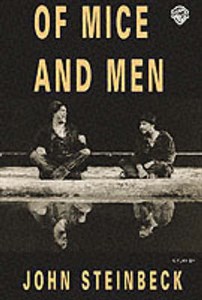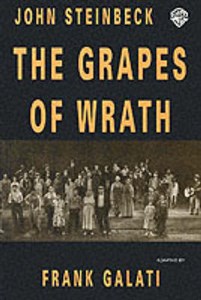John Steinbeck

John Steinbeck
John Steinbeck (1902-68) was born on February 27, 1902, in Salinas, California, and educated at Stanford University. As a youth, he worked as a ranch hand and fruit picker. His works include Cup of Gold (1929), The Pastures of Heaven (1932), To a God Unknown (1933), Tortilla Flat (1935), In Dubious Battle (1936) and Of Mice and Men (1937).
Steinbeck's most widely known work, The Grapes of Wrath (1939; Pulitzer Prize, 1940), the stark account of a family from the impoverished Oklahoma Dust Bowl migrating to California during the economic depression of the 1930s, is an American classic. Other works include The Moon Is Down (1942); Cannery Row (1944), which Rodgers & Hammerstein used as the basis for the musical Pipe Dream; The Wayward Bus (1947); East of Eden (1952); The Winter of Our Discontent (1961) and America and Americans (1968). In 1962 he wrote the popular Travels with Charley, an autobiographical account of a trip across the U.S. accompanied by a pet poodle. Steinbeck was awarded the 1962 Nobel Prize in literature. He died on December 20, 1968, in New York City. His modernization of the Arthurian legends, The Acts of King Arthur and His Noble Knights, was published posthumously in 1976.
Visit The National Steinbeck Center, Salinas, California.
Perform John Steinbeck
View all-
Rodgers & Hammerstein's Pipe Dream
Multiple Authors
Full-Length Musical, ComedyRodgers & Hammerstein's Pipe Dream
Richard Rodgers , Oscar Hammerstein II , John Steinbeck
Full-Length Musical, Comedy / 10w, 17m
Rodgers & Hammerstein's musical adaptation of Steinbeck's novels depicts the drifters and dropouts of Cannery Row with compassion, romance and sympathy.
Shop John Steinbeck
View all-
Rodgers & Hammerstein's Pipe Dream
Multiple Authors
Full-Length Musical, ComedyRodgers & Hammerstein's Pipe Dream
Richard Rodgers , Oscar Hammerstein II , John Steinbeck
Full-Length Musical, Comedy / 10w, 17m
Also available as: -
Of Mice and Men
John Steinbeck
-
The Grapes of Wrath: Playscript
John Steinbeck, Frank Galati
The Grapes of Wrath: Playscript
John Steinbeck ,Frank Galati






